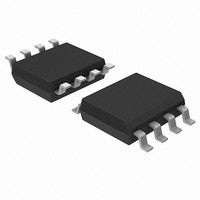NCP1587EDR2G ON Semiconductor, NCP1587EDR2G Datasheet - Page 7

NCP1587EDR2G
Manufacturer Part Number
NCP1587EDR2G
Description
IC PWM CTLR BUCK UVLO 8-SOIC
Manufacturer
ON Semiconductor
Type
Step-Down (Buck)r
Datasheet
1.NCP1587EDR2G.pdf
(16 pages)
Specifications of NCP1587EDR2G
Internal Switch(s)
No
Synchronous Rectifier
Yes
Number Of Outputs
1
Voltage - Output
Adj to 0.8V
Current - Output
1A
Frequency - Switching
275kHz
Voltage - Input
4.5 V ~ 13.2 V
Operating Temperature
-40°C ~ 125°C
Mounting Type
Surface Mount
Package / Case
8-SOIC (0.154", 3.90mm Width)
Lead Free Status / RoHS Status
Lead free / RoHS Compliant
Available stocks
Company
Part Number
Manufacturer
Quantity
Price
Company:
Part Number:
NCP1587EDR2G
Manufacturer:
ON Semiconductor
Quantity:
1 250
UVLO
unexpected behavior does not occur when V
support the internal rails and power the converter. For the
NCP1587E, the UVLO is set to permit operation when
converting from a 5.0 input voltage.
Overcurrent Threshold Setting
ranging from 50 mV to 550 mV, simply by adding a resistor
(RSET) between BG and GND. During a short period of
time following V
10 mA current
determining a voltage drop across R
drop will be sampled and internally held by the device as
Overcurrent Threshold. The OC setting procedure overall
time length is about 6 ms. Connecting a R
between BG and GND, the programmed threshold will be:
is not connected, the device switches the OCP threshold to
a fixed 375 mV value: an internal safety clamp on BG is
triggered as soon as BG voltage reaches 700 mV, enabling
the 375 mV fixed threshold and ending OC setting phase.
The current trip threshold tolerance is ±25 mV. The accuracy
of the set point is best at the highest set point (550 mV). The
accuracy will decrease as the set point decreases.
Current Limit Protection
FET will conduct large currents. The controller will shut
down the regulator in this situation for protection against
overcurrent. The low−side R
the end of each of the LS−FET turn−on duration to sense the
over current trip point. While the LS driver is on, the Phase
voltage is compared to the internally generated OCP trip
voltage. If the phase voltage is lower than OCP trip voltage,
an overcurrent condition occurs and a counter is initiated.
When the counter completes, the PWM logic and both
HS−FET and LS−FET are turned off. The controller has to
go through a Power On Reset (POR) cycle to reset the OCP
fault.
Undervoltage Lockout (UVLO) is provided to ensure that
NCP1587E can easily program an Overcurrent Threshold
RSET values range from 5 kW to 55 kW. In case R
In case of a short circuit or overload, the low−side (LS)
I OCth +
CC
(I
rising over UVLO threshold, an internal
OCSET
I OCSET @ R OCSET
) is sourced from BG pin,
R DS(on)
DS(on)
sense is implemented at
OCSET
CC
OCSET
. This voltage
is too low to
resistor
http://onsemi.com
(eq. 1)
OCSET
7
Drivers
N−channel MOSFETs. This allows the device to address
high−power as well as low−power conversion requirements.
The gate drivers also include adaptive non−overlap
circuitry. The non−overlap circuitry increase efficiency,
which minimizes power dissipation, by minimizing the
body diode conduction time.
drive circuitry used in the chip is shown in Figure 9.
required, to realize the full benefit of the onboard drivers.
The capacitors between V
and SWN must be placed as close as possible to the IC. The
current paths for the TG and BG connections must be
optimized. A ground plane should be placed on the closest
layer for return currents to GND in order to reduce loop area
and inductance in the gate drive circuit.
The NCP1587E includes gate drivers to switch external
A detailed block diagram of the non−overlap and gate
Careful selection and layout of external components is
FAULT
FAULT
Figure 9. Block Diagram
+
-
+
-
2 V
CC
and GND and between BST
V
CC
1
2
8
4
3
BST
TG
PHASE
BG
GND
R
set













